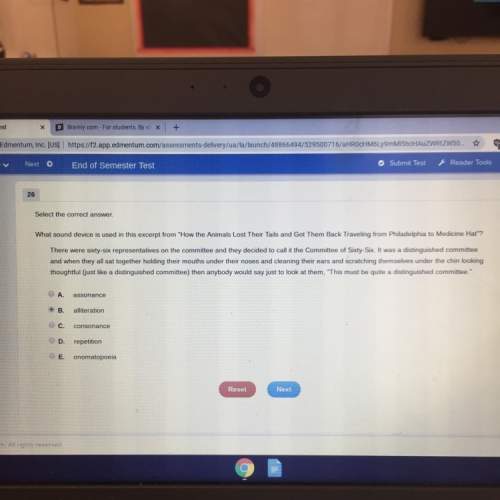

Answers: 1


Other questions on the subject: English

English, 21.06.2019 15:00, desi0322
Need ! how is richard characterized by alger in this excerpt from the passage? "to complete his costume he wore a coat too long for him, dating back, if one might judge from its general appearance, to a remote antiquity." he is exciting. he is intelligent. he is comical. he is happy.
Answers: 3

English, 21.06.2019 22:00, corynanderson16
Ow does the author reveal katina's initial excitement about her internship? a) by showing how katina responds to conflict b) by describing how katina felt at the end of the day c) by showing how katina interacts with other characters d) by describing how katina selected her clothes with care
Answers: 1

English, 22.06.2019 03:50, FlayMaster101
How do the soldiers' feelings about macbeth in act i differ from their laterfeelings about him in act v? a. in act i, theymere jealous of his rise to power; in act v, they feelsorry for him and the burdens he bears. b. in act i, they think he is a bully; in act v, they believe he will make agood king if given enough time to rule. c. in act i, they think he is brave and honorable; in act v, they think heis an insane tyrant who must be defeated. d. in act i, they are frightened of his fierceness; in act v, they areafraid of what horrible crimes he will commit next.
Answers: 1

English, 22.06.2019 04:50, ilawil6545
Read the passage, then answer the question that follows. no one could have seen it at the time, but the invention of beet sugar was not just a challenge to cane. it was a hint—just a glimpse, like a twist that comes about two thirds of the way through a movie—that the end of the age of sugar was in sight. for beet sugar showed that in order to create that perfect sweetness you did not need slaves, you did not need plantations, in fact you did not even need cane. beet sugar was a foreshadowing of what we have today: the age of science, in which sweetness is a product of chemistry, not whips. in 1854 only 11 percent of world sugar production came from beets. by 1899 the percentage had risen to about 65 percent. and beet sugar was just the first challenge to cane. by 1879 chemists discovered saccharine—a laboratory-created substance that is several hundred times sweeter than natural sugar. today the sweeteners used in the foods you eat may come from corn (high-fructose corn syrup), from fruit (fructose), or directly from the lab (for example, aspartame, invented in 1965, or sucralose—splenda—created in 1976). brazil is the land that imported more africans than any other to work on sugar plantations, and in brazil the soil is still perfect for sugar. cane grows in brazil today, but not always for sugar. instead, cane is often used to create ethanol, much as corn farmers in america now convert their harvest into fuel. –sugar changed the world, marc aronson and marina budhos how does this passage support the claim that sugar was tied to the struggle for freedom? it shows that the invention of beet sugar created competition for cane sugar. it shows that technology had a role in changing how we sweeten our foods. it shows that the beet sugar trade provided jobs for formerly enslaved workers. it shows that sweeteners did not need to be the product of sugar plantations and slavery.
Answers: 1
You know the right answer?
which excerpt from the treasure of lemon brown reveals a change in the relationship between lemon br...
Questions in other subjects:

Mathematics, 28.01.2020 17:51

Spanish, 28.01.2020 17:51

World Languages, 28.01.2020 17:51




Social Studies, 28.01.2020 17:51



Mathematics, 28.01.2020 17:51




